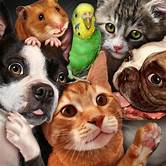Why Is It Bad to Keep Exotic Animals as Pets?
Exotic animals, such as lions, tigers, and snakes, may seem like fascinating and alluring creatures, but keeping them as pets is a highly irresponsible and dangerous practice. Not only does it pose a significant risk to the well-being of the animals and the safety of their owners, but it also contributes to a range of environmental and ecological problems.

Animal Welfare Concerns
1. Inadequate Care: Exotic animals have specialized needs that are often difficult to meet in a domestic setting. They require specific diets, temperature and humidity levels, and spacious enclosures that can accommodate their natural behaviors. Most pet owners lack the knowledge and resources to provide these essential requirements, leading to malnutrition, health issues, and psychological distress in the animals.
2. Risk of Injuries and Attacks: Exotic animals, even those considered "tame," have the potential to cause serious injuries or even death to their owners or others. Their unpredictable behavior and powerful instincts can lead to attacks, especially when they feel threatened or stressed. These attacks can result in severe lacerations, bites, or even fatalities.
3. Zoonotic Diseases: Exotic animals can carry various diseases and parasites transmissible to humans, known as zoonotic diseases. These diseases can range from mild illnesses to severe and life-threatening conditions. Contact with exotic animals, their bodily fluids, or their habitats can expose individuals to these pathogens.
Ecological and Environmental Impacts
1. Habitat Destruction: The demand for exotic pets has contributed to the destruction of natural habitats in various parts of the world. Wild animals are often captured from their native environments to be sold as pets, leading to population declines and disruption of ecosystems. This habitat loss can have cascading effects on other species and the overall biodiversity of the area.
2. Invasive Species: When exotic pets escape or are intentionally released into the wild, they can become invasive species. These non-native animals may compete with native wildlife for resources, contribute to the spread of diseases, and disrupt the ecological balance. Invasive species can cause significant environmental damage and pose a threat to local biodiversity.
3. Hybridization: Keeping exotic animals as pets can lead to hybridization, the interbreeding of different species. This can result in the introduction of genetic material from one species into another, potentially leading to the loss of unique genetic traits and the blurring of species boundaries. Hybridization can disrupt natural ecosystems and reduce biodiversity.
Conclusion
In light of these serious concerns, it is evident that keeping exotic animals as pets is a harmful and irresponsible practice. Exotic animals belong in their natural habitats, where they can thrive and contribute to the delicate balance of ecosystems. It is crucial to raise awareness about the numerous risks associated with keeping exotic pets and to promote responsible and ethical attitudes toward wildlife conservation.
Declaration: All article resources on this website, unless otherwise specified or labeled, are collected from online resources. If the content on this website infringes on the legitimate rights and interests of the original author, you can contact this website to delete it.



